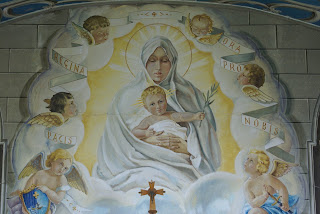
The Orkney Islands are full of surprises. One of the first is that the inhabitants don't really regard them as islands at all in much the same way that Venetians have long ceased to think of themselves as marooned on a collection of islands in a muddy lagoon.
Kirkwall, the capital of Orkney, is situated on a narrow, natural land bridge connecting the two halves of what is known as 'the mainland'. It's difficult to know exactly where this mainland ends as a string of smaller islands stretching away to the south-east were linked up by causeway during World War Two to help re-inforce the wartime naval base of Scapa Flow. From the air they look like a giant island kebab. This system of causeways was named the Churchill Barriers and the work on them was largely completed by Italian prisoners-of-war who were interned on the Orkneys (or 'in Orkney' as they would have learned to say) for much of the war.
Today the most poignant reminder of their time of incarceration, exile and hard labour is the small chapel on Lamb Holm which overlooks the Barriers from the site of their camp. The story goes that one of the POW's, the indomitable Domenico Chiocchetti, persuaded the camp commander to allow the prisoners to spend their spare time converting a pair of Nissen huts into a chapel. It must have been a relatively easy call for the mild mannered, Italian-speaking Major T.P. Buckland who then watched with growing admiration and wry amusement as Chiocchetti wrangled and wheedled every ounce of spare concrete and ingenuity out of his 550 fellow inmates and proceded to create a minor masterpiece. The spirit of da Vinci and Michelangelo captured in plasterboard, painted concrete and painstakingly re-worked barbed wire.
The effect today is of walking into a school theatre set skilfully knocked up by the woodwork teacher, lovingly decorated by the art master and cunningly dressed by a devoted parent drawing on a basket of old props. Indeed Signor Chiocchetti had staged full-scale operatic productions featuring cardboard gondolas and canvas and chicken wire palazzos before he turned the force of his creative genius to the construction of the chapel.
Behind the altar Chiocchetti painted a fresco of the Madonna and Child copied faithfully from a post card sent by his mother in Moena that he carried with him throughout the war. It is a most serenely beautiful piece.

At the end of the war, Ccioccetti remained in Orkney to complete his legacy and then returned in 1960 with members of his extended family and old comrades to re-consecrate his place of wartime worship. It's easy to picture him fussing over the positioning of the carved wooden stations of the cross or polishing the wrought iron railings of the rood screen one last time.
Before he left the mainland, he wrote an open letter to the people of Orkney. In it, he said "The chapel is yours, for you to love and preserve. I take with me to Italy the remembrance of your kindness and wonderful hospitality. I shall remember always, and my children shall learn from me to love you." It is difficult to craft a more resounding statement of reconciliation between peoples that that.
Perhaps every man is an island after all.




